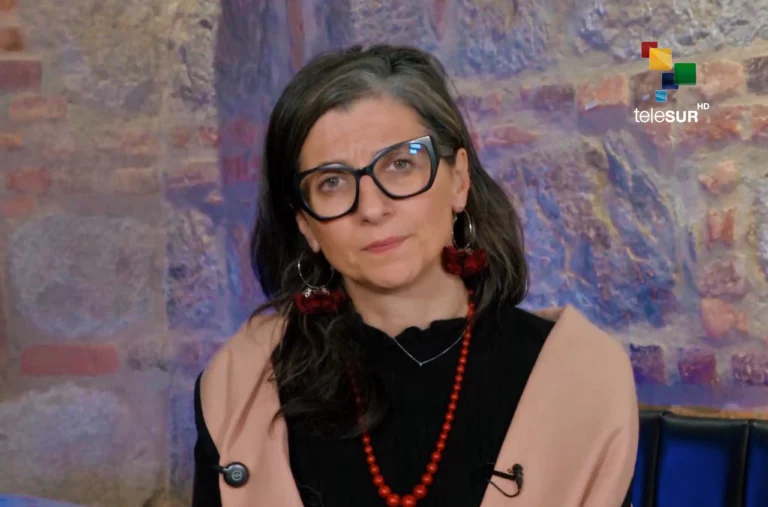Exclusive: UN’s Albanese Proposes Revolutionary Approach to Palestinian Crisis

July 16, 2025 Hour: 10:21 pm
In an exclusive interview with teleSUR, Francesca Albanese, the United Nations (UN) Special Rapporteur for the Occupied Palestinian Territories, has voiced her concerns regarding the effectiveness of the UN in addressing the plight of Palestine.
RELATED:
UN Rapporteur Accuses Multinationals of Profiting from Israeli Genocide
Albanese’s remarks come in the context of the first Emergency Ministerial Conference on Palestine held in Bogota, Colombia.
She expressed that the organization has fallen short in its responsibilities largely due to the influence of its member states, particularly the United States.
The Limitations of the UN in Addressing Palestine
Albanese pointed out that while the UN has passed various resolutions concerning Palestine, these have often been stalled or undermined by the US veto power in the Security Council.
“The UN does not operate independently from its member states,” she explained, highlighting the complexities of international politics that hamstring the organization’s ability to act decisively.
This inaction perpetuates the suffering of Palestinians, who have faced decades of occupation and violence.
The ‘Potentially Revolutionary’ Proposal from The Hague Group
During the interview, Albanese described a proposal from the Hague Group, which aims to gather various states together to collectively take action that could positively impact the Palestinian situation.
She characterized this initiative as “potentially revolutionary,” as it encourages countries to refrain from supplying arms, providing military support, or facilitating commerce that could harm the Palestinian people.
She emphasized the importance of accountability and international law, advocating for states to confront those complicit in human rights violations against Palestinians.
According to Albanese, the time is ripe for collective action, especially as we recognize two years of escalated violence against Palestinians.
“This moment is not just an opportunity; it is a responsibility for countries to stand up and do what is right”, she said.
Economic Ties: A Double-Edged Sword
As the conversation deepened, Albanese shared concrete suggestions for how countries like Colombia and other Global South nations could contribute to a resolution.
She advocated suspending agreements on military aid or natural resource trade (like coal) that could support the oppression of Palestinians, specifically ending purchases of arms and security services linked to Israeli military actions.
Moreover, Albanese’s recent report, titled “The Economy of Genocide and Illegal Settlements,” highlights the role of multinational corporations profiting from the suffering of Palestinians.
She pointed out that many companies operate within the framework of illegal occupation and are thus complicit in the displacement and disenfranchisement of Palestinian communities.
Understanding the Broader Context of Occupation
Albanese explained that the Israeli occupation is economically sustained by state actors, businesses, and institutions worldwide.
“It’s not merely a conflict between nations; it’s an economy built on oppression,” she stated.
She detailed how banks and universities are enmeshed in practices that uphold illegal settlements and contribute to apartheid conditions for Palestinians.
Albanese’s insights underscore a critical understanding: without holding these entities accountable, the cycle of violence and exploitation will endure.
She urged for a greater impetus to regulate corporate behaviors and ensure they adhere to international law—especially as they pertain to territories under occupation.
Confronting Allegations and Upholding Human Rights
In light of her outspoken stances, Albanese faced backlash from certain quarters, including accusations of antisemitism when she critiqued US-based companies for their ties to Israel.
She refuted the claims, asserting her objective has always been to advocate for human rights and uphold international law.
“I am here to address human rights violations,” she clarified, “not to attack any group based on their identity.”
Her unapologetic stance highlights her commitment to a professional and legal approach to human rights advocacy, emphasizing the importance of evidence-based reporting in her role.
The Need for Reform Within the UN System
Albanese didn’t mince words when addressing the systemic issues within the UN itself. She lamented that after more than 70 years of inaction regarding Palestine, it is evident that if the UN is not part of the solution, it might very well be part of the problem.
She advocated for reformed enforcement mechanisms to ensure that states that violate international law face consequences, stating, “We cannot live in a world where rights are ambiguous.”
Her call for genuine empathetic engagement and the elimination of double standards reflects a desire for a more equitable global governance structure.
Albanese advocates for a UN grounded in genuine universalism, ensuring all nations are equally accountable to human rights and international law.
A Call for Unity and Action
Francesca Albanese’s assertions remind us of the urgent need for solidarity with the Palestinian cause. In a landscape fraught with complexities and challenges, her clarion call for unity resonates deeply.
By fostering a collective approach to advocacy and ensuring accountability, the international community can begin to address the injustices that have plagued Palestine for far too long.
As we digest Albanese’s compelling insights, it becomes increasingly clear: the path forward requires courage, political will, and a firm commitment to justice from nations around the globe.
Achieving peace and dignity for Palestinians requires collective action.
Author: Manuel F. Diaz
Source: teleSUR

